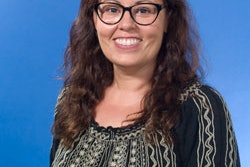Take one step into Dr. Lara A. Thompson’s engineering lab at the University of the District of Columbia (UDC), with its hightech equipment, and you will quickly get a glimpse of why Thompson loves what she does.
“None of this was here before,” says Thompson, an assistant professor of mechanical engineering and director of the biomedical engineering program at UDC, of the spacious facility that is now used to conduct postural and rehabilitation research for stroke survivors, the elderly who are susceptible to falls, and current and former athletes.
The lab, which was established as a result of a three-year National Science Foundation grant of $400,000, includes sophisticated equipment that measures, among many things, an individual’s balance and movements.
For Thompson, who wrote the proposal for the creation of the Biomedical Engineering Program at UDC, this type of cutting-edge work is what excites her most about working in the academy. Born in Boston, Thompson grew up in southern New Hampshire and matriculated at the University of Massachusetts Lowell, where her father — a professor of electrical and computer engineering and director of the school’s Center for Advanced Computation and Telecommunications — remains on the faculty.
“Growing up I had a lot of interests, and I had a lot of energy,” says Thompson who took the advice of her UMass Lowell professor and went on to Stanford University for graduate school and earned a master’s in aeronautical and astronautical engineering.
From 2005 to 2007, Thompson worked as a mechanical engineer at Charles Stark Draper Laboratory and then enrolled in the Harvard-MIT Division of Health Sciences and Technology at Massachusetts Institute of Technology, where she earned a doctorate in biomedical engineering in 2013. When it was time for her to go on the job market, she interviewed and landed the job at UDC.
At UDC, Thompson encourages her students — the majority of whom are minorities and fi rst-generation students — that they can accomplish whatever they set out to do.




















